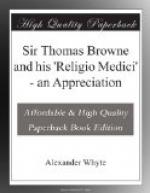Sir Thomas Browne was a noble illustration of Bacon’s noble law. For Sir Thomas carried all his studies, experiments, and operations to such a depth in his own mind, and heart, and imagination, that he was able to testify to all his fellow-physicians that he who studies man and medicine deeply enough will meet with as many intellectual, and scientific, and religious adventures every day as any traveller will meet with in Africa itself. As a living man of genius in the medical profession, Dr. George Gould, has it in that wonderful Behmenite and Darwinian book of his, The Meaning and the Method of Life, ‘A healing and a knitting wound,’ he argues, ’is quite as good a proof of God as a sensible mind would desire.’ This was Sir Thomas Browne’s wise, and deep, and devout mind in all parts of his professional and personal life. And he was man enough, and a man of true science and of true religion enough, to warn his brethren against those ‘academical reservations’ to which their strong intellectual and professional pride, and their too weak faith and courage, continually tempted them. Nor has he, for his part, any clinical reservations in religion either, as so many of his brethren have. ‘I cannot go to cure the body of my patient,’ he protests, ’but I forget my profession and call unto God for his soul.’ To call Sir Thomas Browne sceptical, as has been a caprice and a fashion among his merely literary admirers: and to say it, till it is taken for granted, that he is an English Montaigne: all that is an abuse of language. It is, to all but a small and select circle of writers and readers, utterly misleading and essentially untrue. And, besides, it is right in the teeth of Sir Thomas’s own emphatic, and repeated, and indignant denial and repudiation of Montaigne. Montaigne, with all his fascinations for literary men, and they are great; and with all his services to them, and they are not small; is both an immoral and an unbelieving writer. Whereas, Sir Thomas Browne never wrote a single line, even in his greenest studies, that on his deathbed he desired to blot out. A purer, a humbler, a more devout and detached hand never put English pen to paper than was the hand of Sir Thomas Browne. And, if ever in his greener days he had a doubt about any truth of natural or of revealed religion, he tells us that he had fought down every such doubt in his closet and on his knees.
I will not profanely paraphrase, or in any way water down the strong words in which Sir Thomas Browne writes to himself in his secret papers about prayer. All that has been said about this very remarkable man only makes what we are now to read all the more remarkable and memorable. All Sir Thomas Browne’s readers owe an immense debt to Simon Wilkin; and for nothing more than for rescuing for us these golden words of this man of God. ‘They were not,’ says Wilkin, ’intended by Browne for the perusal of his son, as so many of his private papers were, or of any one else.’ And hence their priceless value.




